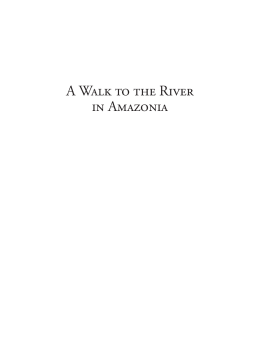
Additional Information
Book Details
Abstract
Our lives are mostly composed of ordinary reality — the flow of moment-to-moment existence — and yet it has been largely overlooked as a subject in itself for anthropological study. In this work, the author achieves an understanding of this part of reality for the Mehinaku Indians, an Amazonian people, in two stages: first by observing various aspects of their experience and second by relating how these different facets come to play in a stream of ordinary consciousness, a walk to the river. In this way, abstract schemata such as ‘cosmology,’ ‘sociality,’ ‘gender,’ and the ‘everyday’ are understood as they are actually lived. This book contributes to the ethnography of the Amazon, specifically the Upper Xingu, with an approach that crosses disciplinary boundaries between anthropology, philosophy, and psychology. In doing so it attempts to comprehend what Malinowski called the ‘imponderabilia of actual life.’
Carla Stang received her undergraduate degree at the University of Sydney and was awarded the Frank Bell Memorial Prize for Anthropology for her studies there. In 2005, she earned her Ph.D. in Social Anthropology at the University of Cambridge. Since then she held the position of Visiting Scholar at Columbia University, and is now an Associate Researcher at the University of Sydney. Thus far most of her ethnographic fieldwork has been in the Upper Xingu region of the Brazilian Amazon.
“It's a great book... The focussing in on the 'feel' of life, the small everyday things, struck me as hugely important. The fascinating conundrums of original and spirit copy.... The simplicity and grace of the writing.” · Michael Taussig, Columbia University
“This is brave anthropology, a tale like Avatar but about the actual lives of real people, the Mehinaku of central Brazil, who have lived for centuries outside the range of Western civilization. Now, facing extinction, they have journeyed from their world to ours, demanding the survival of their people and culture…Stang sets a courageous example in trying to preserve biological and cultural diversity as a resource for all future life. This treasure cannot be preserved by global tracking devices alone, but by empathy and listening, which she displays with admirable sensitivity. She has discovered a treasure." · Tom Hayden, Scripps College
“The book’s integration of cosmology with everyday Mehinaku practice, along with its concise and evocative writing style, makes for an important contribution to Amazonian anthropology … Stang’s book is one of the best examples of how Amazonian research today is beginning to bridge the previous gap between studies of seemingly abstract cosmology and fine-grained ethnography of everyday practice.” · JRAI
“…an extraordinary ethnographic work… outstanding – in the audacious naturalism of its form, the compelling way in which Stang reads Mehinaku reality between the lines, capturing the flow and fluctuations of consciousness as well as the materiality and physicality of their existence.” · Michael Jackson, Harvard University
“This is an important study both as ethnography and as an interpretive achievement. To my mind there is no better study from Amazonia that elucidates specifically the archetypal scheme of reality which is an extraordinary notion commonly encountered in Amazonian life-worlds... The book will be a contribution to South American anthropology and, even more significantly, to the growing field of comparative cosmologies and comparative systems of knowledge.” · Jadran Mimica, University of Sydney
"This [book] is... refreshing because the normal picture of Amazonian symbolism/cosmology is typically written by men and based on observations of male ritual... Carla... show[s] how ordinary people (in this case, women) think about and experience an enchanted world rather than what the ritual experts (and anthropologists) claim... There is an abundance of clever, imaginative anthropological interpretations of what Amazonians say and do... What very few have ever really asked is how all this... is actually experienced and understood by the people involved. Carla does that and does it very well." · Stephen Hugh-Jones, University of Cambridge
